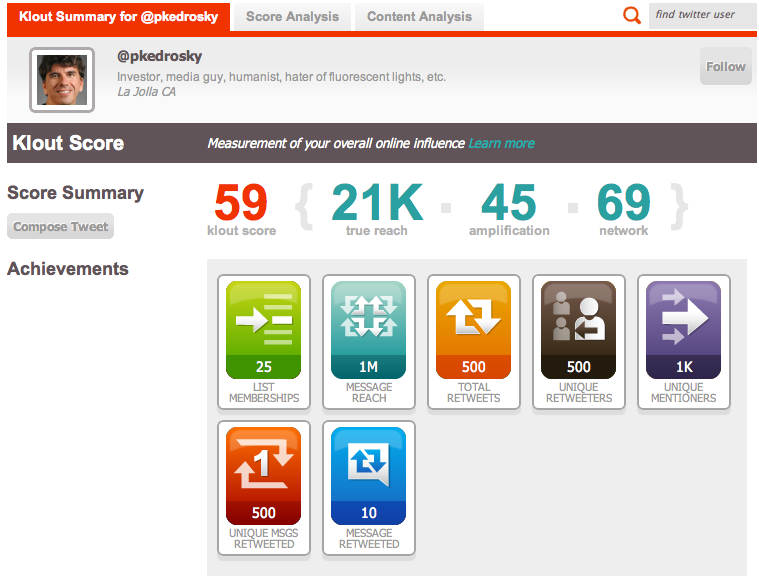 On the Internet, nobody knows you’re an expert. PeerIndex hopes to change that.
On the Internet, nobody knows you’re an expert. PeerIndex hopes to change that.
A decade and a half after the Web became a mass medium, people still don’t trust what they read online. Yet social media is clearly shaping consumer behavior, and companies would like to know who the real authorities are in order to better target their marketing. That’s why startups like PeerIndex have sprung up. They aim to mine publicly available data from social networks to identify the Web’s new pundits.
PeerIndex, a London-based startup backed by a host of European angels, unveiled its website Wednesday morning. Cofounder and CEO Azeem Azhar gave VentureBeat a sneak peek earlier this week. PeerIndex’s algorithms mine data from Twitter, Facebook, LinkedIn and blogs to rate people on their authority, activity, and audience.
Azhar said he hopes to charge businesses for custom analyses and deeper access to PeerIndex’s data. The company hasn’t unveiled specifics about pricing, but Azhar said he expects his products to have “enterprise pricing — not hundreds of dollars, but not tens of thousands of dollars.”
Authority measurement is an increasingly crowded space. Klout, a San Francisco-based startup which has raised $1.5 million and has 14 employees, currently tracks Twitter, as do Twitalyzer and Twitter Grader. (Twitter, the popular microblogging service, has discussed charging businesses for advanced data analytics, too.) But Klout CEO Joe Fernandez told VentureBeat he plans to expand Klout’s analytics to other social networks soon.
The challenge for these companies will be to come up with lists of experts that match users’ expectations — a search for broadband experts should turn up GigaOm’s Om Malik, for example — while simultaneously providing surprise, a sense that the algorithm is uncovering new people to talk to. Klout’s lists feel random and unruly compared to PeerIndex’s well-ordered rankings. PeerIndex’s profile of venture capitalist and commentator Paul Kedrosky, putting him in the top 1 percent of influencers, feels closer to the truth than his Klout score:


The first consumers of PeerIndex are likely to be the vainest people online: bloggers, social media marketers, and other would-be experts seeking another ranking to validate them. If Azhar’s algorithms are as clever as he is, they may be disappointed to find that their signal is less than their noise. But if he’s able to track the Kedroskys of the Web, and give them the grades they deserve for quality of output, not just quantity, businesses may start to deem him influential, too.
VentureBeat's mission is to be a digital town square for technical decision-makers to gain knowledge about transformative enterprise technology and transact. Learn More
